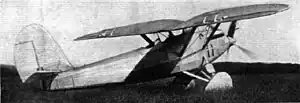| Do 10 | |
|---|---|
 | |
| Role | Fighter aircraft |
| National origin | Germany |
| Manufacturer | Dornier Flugzeugwerke |
| First flight | 24 July 1931[1] |
| Developed from | Dornier Komet |
The Dornier Do 10, originally designated Dornier Do C4, was the name given by the Reichsluftfahrtministerium (RLM) of a pre-World War II German aircraft.
It was a two-seat parasol-wing monoplane, intended to be used as a fighter. Two prototypes were built in 1931 to fulfil a requirement for a two-seat fighter. Having failed to gain a production order, the Do C4 / Do 10 was used to test a tilting engine installation and propellers to suit, for STOL tests.
Specifications

Dornier Do C4 3-view drawing from L'Aerophile July 1934
| Type | Two-seat fighter | |||
| Engine | Rolls-Royce Kestrel IIIS | BMW VI 7.3 (703) | Hispano-Suiza 12 Xbrc (Ybre?) | |
| Power | 391 kW (525 hp) | 485 kW (650 hp) | 515 kW (690 hp) | |
| Dimensions |
|
|
| |
| Weights |
|
|
| |
| Performance |
|
| ||
| Armament | Four × MG 08/15 machine guns (two forward, two in rear turret) | |||
Sources
Wikimedia Commons has media related to Dornier Do 10.
- Luftwaffe 39-45 Archived 2017-01-31 at the Wayback Machine (in Portuguese)
- Histaviation.com
- Virtual Aviation Museum
- Notes
- ↑ Green and Swanborough 1994, p. 185.
- Bibliography
- Green, William and Swanborough, Gordon. The Complete Book of Fighters. New York: Smithmark, 1994. ISBN 0-8317-3939-8.
(Information on this model is difficult to come by and the nature of the relationship between C1/C4/10 is not yet totally resolved)
This article is issued from Wikipedia. The text is licensed under Creative Commons - Attribution - Sharealike. Additional terms may apply for the media files.